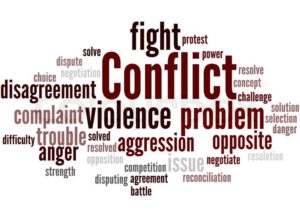Is conflict always a bad thing or might it be a chance to grow? What is your response to conflict? How might you move from holy conflict to sacred response: hope, healing, resilience, and reconciliation? — Rev Gail
Excerpt from commentary by Chanequa Walker-Barnes: Conflict is not a threat that needs to be prevented or extinguished. It is an important dynamic for the growth and health of any organization. In fact, as Margaret Kornfeld states in her book, Cultivating Wholeness, the healthier that a community is, the more potential there is for conflict to emerge. Perhaps this is the understanding of conflict that the author of Proverbs had in mind when they wrote, “Iron sharpens iron, and one person sharpens the wits of another” (Prov. 27:17 NRSV). When conflict is expressed, acknowledged, and worked through, it can be a blessing that facilitates growth, strength, and positive innovation. The challenge for us is to learn how to be comfortable with the tension that conflict creates. After all, we don’t want to block the blessing.
“I am the holy being of my mother’s prayer and my father’s song”
—Norman Patrick Brown, Dineh Poet and Speaker
Recognize whose lands these are on which we stand.
Ask the deer, turtle, and the crane.
Make sure the spirits of these lands are respected and treated with goodwill.
The land is a being who remembers everything.
You will have to answer to your children, and their children, and theirs—
The red shimmer of remembering will compel you up the night to walk the perimeter of truth for understanding.
As I brushed my hair over the hotel sink to get ready I heard:
By listening we will understand who we are in this holy realm of words.
Do not parade, pleased with yourself.
You must speak in the language of justice.
— Thich Nhat Hahn’s Plum Village Lineage North American Dharma Teachers Sangha. Read and download full article with exercises and meditations.
A common way of attempting to resolve conflict is to attempt to determine who owns what percentage of the blame for a conflict. An alternative perspective is for each person to shift their focus from who is to blame for the conflict to what their personal experience in the conflict is.
The intention and focus is on restoring harmony which requires all parties to let go of the victim perspective. Each person explores what they are bringing of themselves to the conflict and what attitudes, beliefs, past learnings, and ways of being contributed to the conflict unfolding as it did.
The focus is on identifying and speaking about these things rather than on who did what wrong. We use the experience of conflict as an opportunity to learn about ourselves and others, as well as to develop more skillful responses.

Conflict 101 — Helpguide.org. For more info, read the whole article.
- A conflict is more than just a disagreement. It is a situation in which one or both parties perceive a threat (whether or not the threat is real).
- Conflicts continue to fester when ignored. Because conflicts involve perceived threats to our well-being and survival, they stay with us until we face and resolve them.
- We respond to conflicts based on our perceptions of the situation, not necessarily to an objective review of the facts. Our perceptions are influenced by our life experiences, culture, values, and beliefs.
- Conflicts trigger strong emotions. If you aren’t comfortable with your emotions or able to manage them in times of stress, you won’t be able to resolve conflict successfully.
- Conflicts are an opportunity for growth. When you’re able to resolve conflict in a relationship, it builds trust. You can feel secure knowing your relationship can survive challenges and disagreements.
Tips for managing and resolving conflict. — Helpguide.org. For more info, read the whole article.
You can ensure that the process of managing and resolving conflict is as positive as possible by sticking to the following guidelines:
- Listen for what is felt as well as said. When you really listen, you connect more deeply to your own needs and emotions, and to those of other people. Listening also strengthens, informs, and makes it easier for others to hear you when it’s your turn to speak.
- Make conflict resolution the priority rather than winning or “being right.” Maintaining and strengthening the relationship, rather than “winning” the argument, should always be your first priority. Be respectful of the other person and their viewpoint.
- Focus on the present. If you’re holding on to grudges based on past conflicts, your ability to see the reality of the current situation will be impaired. Rather than looking to the past and assigning blame, focus on what you can do in the here-and-now to solve the problem.
- Pick your battles. Conflicts can be draining, so it’s important to consider whether the issue is really worthy of your time and energy. Maybe you don’t want to surrender a parking space if you’ve been circling for 15 minutes, but if there are dozens of empty spots, arguing over a single space isn’t worth it.
- Be willing to forgive. Resolving conflict is impossible if you’re unwilling or unable to forgive others. Resolution lies in releasing the urge to punish, which can serve only to deplete and drain your life.
- Know when to let something go. If you can’t come to an agreement, agree to disagree. It takes two people to keep an argument going. If a conflict is going nowhere, you can choose to disengage and move on.
Seeds of Conflict
Conflict cannot survive without your participation. — Wayne Dyer
Conflict arises when people have different needs or views of a situation. — kidsmatter.edu.au
A conflict begins and ends in the hearts and minds of people, not in the hilltops. — Amos Oz
There are three principles in a man’s being and life, the principle of thought, the principle of speech, and the principle of action. The origin of all conflict between me and my fellow-men is that I do not say what I mean and I don’t do what I say. — Martin Buber
In a few decades, the relationship between the environment, resources and conflict may seem almost as obvious as the connection we see today between human rights, democracy and peace. — Wangari Maathai
In times of conflict, war, poverty or religious fundamentalism, women and children are the first and most numerous victims. Women need all their courage today. — Isabel Allende
When poor people get involved in a long conflict, such as a strike or a civil rights drive, and the pressure increases each day, there is a deep need for spiritual advice. Without it, we see families crumble, leadership weaken, and hard workers grow tired. — Cesar Chavez
We have the potential to help people out of poverty, out of disease, out of slavery and out of conflict. Too often, we turn the other way because we think there’s nothing we can do. — Alicia Keys
As Barbara Brown Taylor has written, “Because … people tend to think they should not fight, most of them are really bad at it.” You know how it goes. The tension is high … But rather than say anything, everyone sits in silence … play nice. Then, out in the … parking lot or at home, clicking away on the laptop, all the feelings come out. And usually, all the feelings come out to the wrong people in the wrong way. — Doyle Sager
Fruits of Wisdom: Responses to Conflict
For good ideas and true innovation, you need human interaction, conflict, argument, debate. — Margaret Heffernan
It is possible instead to respond to conflict in positive ways that seek a fair outcome. Instead of being seen as a win-lose competition, conflict can be seen as an opportunity to build healthier and more respectful relationships through understanding the perspectives of others. — kidsmatter.edu.au
Man must evolve for all human conflict a method which rejects revenge, aggression and retaliation. The foundation of such a method is love. — Martin Luther King, Jr.
I am a woman in process. I’m just trying like everybody else. I try to take every conflict, every experience, and learn from it. Life is never dull. — Oprah Winfrey
God’s love is too great to be confined to any one side of a conflict or to any one religion. — Desmond Tutu
The goal of difficult conversations is not winning people to our side. When the point becomes winning the argument, we have already lost. Tough conversations are about creating space for growth and mutual respect, not controlling others. — Doyle Sager
Somewhere, we got the idea that any kind of conflict is bad. We feel uncomfortable and ill at ease when it occurs. Most of us treat conflict with two options: avoid it at all costs or ignore it when it happens … The bad news is that conflict is inevitable in your life. No matter how hard you try to walk away from a conflict, it just keeps presenting itself to you. There comes a moment when you have to deal with it. The good news is that you don’t have to deal with it alone. Begin with prayer. Acknowledge how you feel about the situation. Ask God to show you why you feel the way you do. Often the reason for an emotion has nothing to do with the present circumstance but is based on an event or experience from some other place or time in your life. Pray earnestly for the person(s) and circumstances that are causing the conflict, asking the Holy Spirit to mediate between you and them. Ask for God’s wisdom to deal with the conflict in a positive way. Expect blessings to come from this conflict, and thank God for them. — Excerpted from a minister’s commentary on conflict

